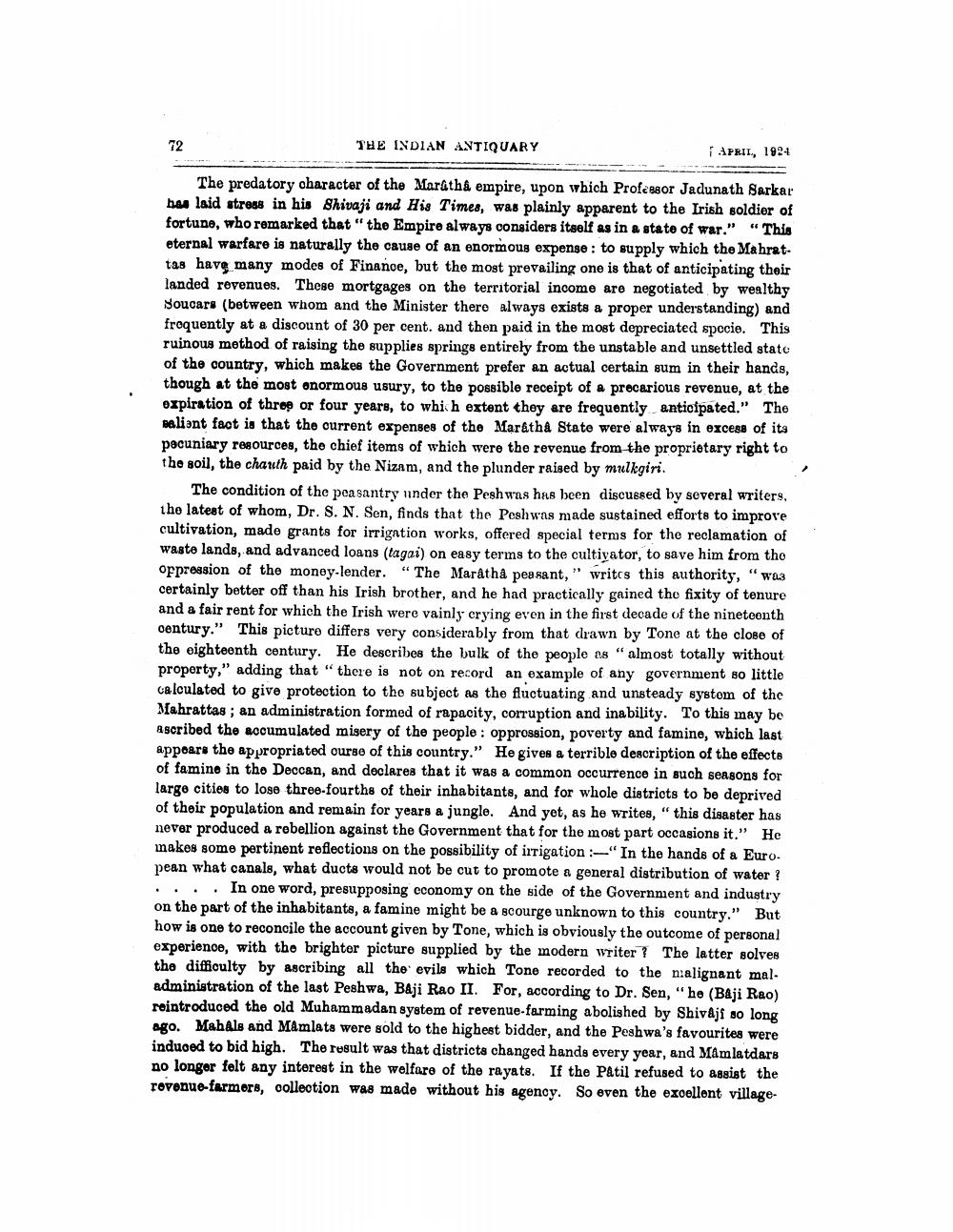________________
THE INDIAN ANTIQUARY
1 APRIL, 1924
The predatory character of the Maratha empire, upon which Professor Jadunath Sarkar hos laid stress in his Shivaji and His Times, was plainly apparent to the Irish soldier of fortune, who romarked that "the Empire always considers itself as in a state of war." "This eternal warfare is naturally the cause of an enormous expense: to supply which the Mahrattas have many modes of Finance, but the most prevailing one is that of anticipating their landed revenues. These mortgages on the territorial income are negotiated by wealthy Soucars (between whom and the Minister there always exists a proper understanding) and frequently at a discount of 30 per cent. and then paid in the most depreciated spocie. This ruinous method of raising the supplies springs entirely from the unstable and unsettled state of the country, which makes the Government prefer an actual certain sum in their hands, though at the most enormous usury, to the possible receipt of a precarious revenue, at the expiration of throp or four years, to which extent they are frequently anticipated." The beliant fact is that the current expenses of the Maratha State were always in excess of its pecuniary resources, the chief items of which were the revenue from the proprietary right to the soil, the charth paid by the Nizam, and the plunder raised by mulkgiri.
The condition of the peasantry under the Peshwas has been discussed by several writers, the latest of whom, Dr. S. N. Sen, finds that the Peshwas made sustained efforts to improve cultivation, made grants for irrigntion works, offered special terms for the reclamation of Waste lands, and advanced loans (tagai) on easy terms to the cultivator, to save him from the of pression of the money-lender. “The Marâthå peasant," writes this authority, "was certainly better off than his Irish brother, and he had practically gained the fixity of tenure and a fair rent for which the Irish were vainly crying even in the first decade of the nineteenth century." This picture differs very considerably from that drawn by Tone at the close of the eighteenth century. He describes the bulk of the people as "almost totally without property," adding that "there is not on record an example of any government so little Calculated to give protection to the subject as the fluctuating and unsteady systom of the Mahrattas; an administration formed of rapacity, corruption and inability. To this may be Ascribed the accumulated misery of the people : opprossion, poverty and famine, which last appears the appropriated ourse of this country." He gives a terrible description of the effects of famino in the Deccan, and declares that it was a common occurrence in such seasons for large cities to lose three.fourths of their inhabitants, and for whole districts to be deprived of their population and remain for years a jungle. And yet, as he writes," this disaster has never produced a rebellion against the Government that for the most part occasions it." He makes some pertinent reflections on the possibility of irrigation :-"In the hands of a European what canals, what ducts would not be cut to promote a general distribution of water? .... In one word, presupposing economy on the side of the Government and industry on the part of the inhabitants, a famine might be a scourge unknown to this country." But how is one to reconcile the account given by Tone, which is obviously the outcome of personal experienoe, with the brighter picture supplied by the modern writer? The latter solves the difficulty by ascribing all the evils which Tone recorded to the malignant maladministration of the last Peshwa, Baji Rao II. For, according to Dr. Sen, "he (Baji Rao) reintroduced the old Muhammadan system of revenue-farming abolished by Shivaji so long ago. MahAls and Mamlats were sold to the highest bidder, and the Peshwa's favourites were induced to bid high. The rusult was that districts changed hands every year, and Mamlatdars no longer felt any interest in the welfare of the rayate. If the Patil refused to assist the rovenue-farmors, collection was made without his agency. So even the exoellent village




